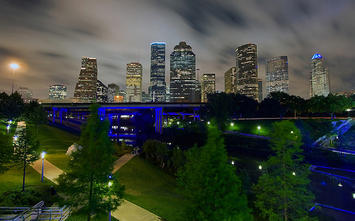
Last week was the 7th anniversary of my blog, Houston Strategies. After 947 posts (cream of the crop here), almost half a million visitors, and thousands of comments in an epic dialogue about Houston, I thought this would be a good time stand back, look at the big picture, and ask "What should be next for Houston?" while linking back to some of the gems from that archive.
First, let's look at where we are currently. Our foundation is in great shape. Houston has started the 21st-century with a set of rankings and amenities 99% of the planet’s cities would kill for: a vibrant core with several hundred thousand jobs; a profitable and growing set of major industry clusters (Energy, the Texas Medical Center, the Port); the second-most Fortune 500 headquarters in the country; top-notch museums, festivals, theater, arts and cultural organizations; major league sports and stadiums; a revitalized downtown; astonishing affordability (especially housing); a culture of openness, friendliness, opportunity, and charity (reinforced by Katrina); the most diverse major city in America; a young and growing population (fastest in the country); progressiveness; entrepreneurial energy and optimism; efficient and business-friendly local government; regional unity; a smorgasbord of tasty and inexpensive international restaurants; and tremendous mobility infrastructure (including the freeway and transit networks, railroads, the port, and a set of truly world-class hub airports).
To those I'd add:
- A philosophy of Opportunity Urbanism, with the highest standard of living among major metros in the country and probably the world (i.e. how well the median income household lives)
- A great competitive advantage in free market land-use regulation
- We're mostly following the ten principles for developing a great city
- We offer a "best of both worlds" between a big, multi-ethnic, international city with great amenities, culture, and opportunities, while also being affordable and fast-growing with a feeling of community (the "big small town").
With all that, it's really easy to get complacent. In fact, in some ways I think we might be coasting a bit now. But coasting is definitely not how we got here. Big initiatives are a proud tradition here: dredging the original port, founding the Texas Medical Center, establishing the Johnson Space Center, and being the first in the world to build a gigantic, futuristic, multi-purpose domed stadium - just to name a few examples. But what should be next? Where should the world's Energy Capital put its energy, so to speak?
I was recently inspired by the Urbanophile's post on Indianapolis' 40-year economic development and tourism strategy built around sports. Starting with nothing but the Indy 500 they've built a string of wins all the way up to hosting one of the most successful Super Bowls ever last month. We need that same sort of sustained, long-term strategy that goes beyond specific projects to a theme we can weave into everything we do over the decades ahead. We need to take the energy boom we're currently enjoying and invest it to secure our long-term prosperity no matter how technology shifts in the future (most especially energy technology).
In an unpredictable world, the only safe bet is a talent base that can adapt. With the Texas Medical Center, we concentrated health care talent in a district that has grown and adapted into the largest medical concentration in the world with an array of world class facilities. We've done the same on an even larger scale with energy and engineering talent. The next step is to take that strategy and generalize it to focus on being the global capital of applied STEM (Science/Technology/Engineering/Math) talent. We need to mobilize the city around a common purpose of building this human infrastructure. We need to embed it into our education, tourism, cultural and economic development strategies. It's just a perfect fit for Houston on so many levels:
- Fits our existing industries and those we're targeting for the future
- A unifying umbrella over energy, health care, aerospace, and education
- Matches our engineering competencies while also differentiating us from other cities
- It fits our brand
- It provides metrics we can measure to track our progress, like STEM degrees, jobs, tourists, and students
- There seems to be a broad consensus across the community about its importance
- Our diverse set of ethnic and national communities means all cultures can be comfortable here, attracting both talented students and foreign subsidiaries from around the globe
In particular, I think we should focus on applied STEM - systems-based problem solving (engineering) over pure knowledge (where we are at a competitive disadvantage with many university clusters around the country). Facilitating man's progress through innovative problem solving.













